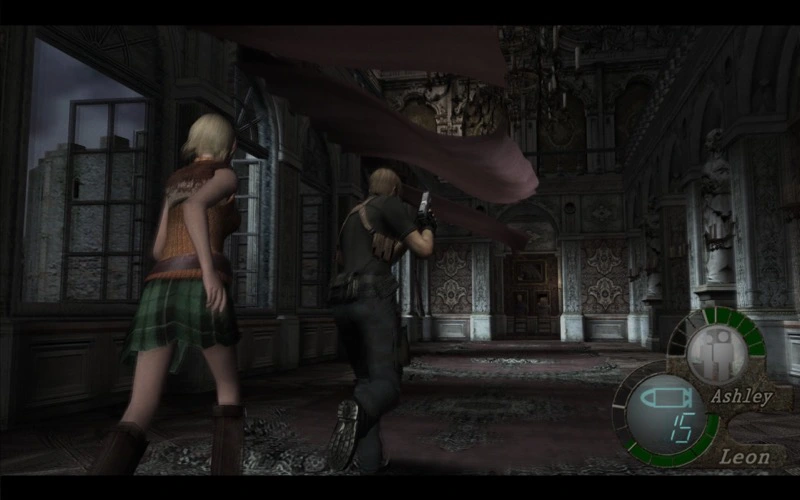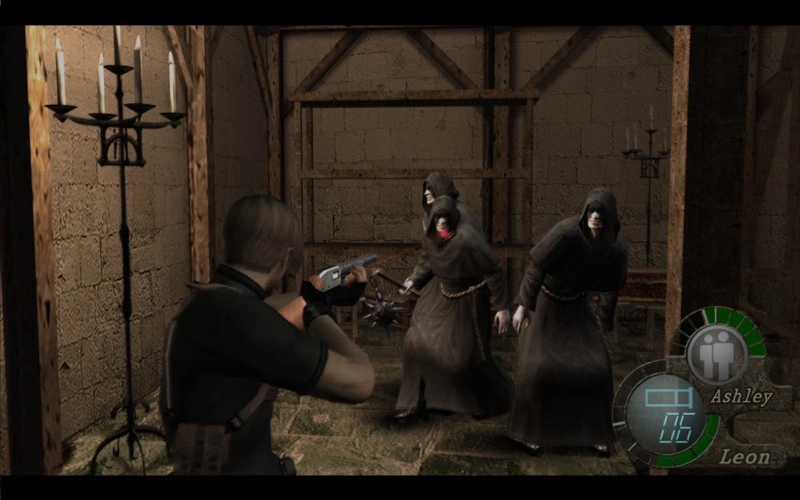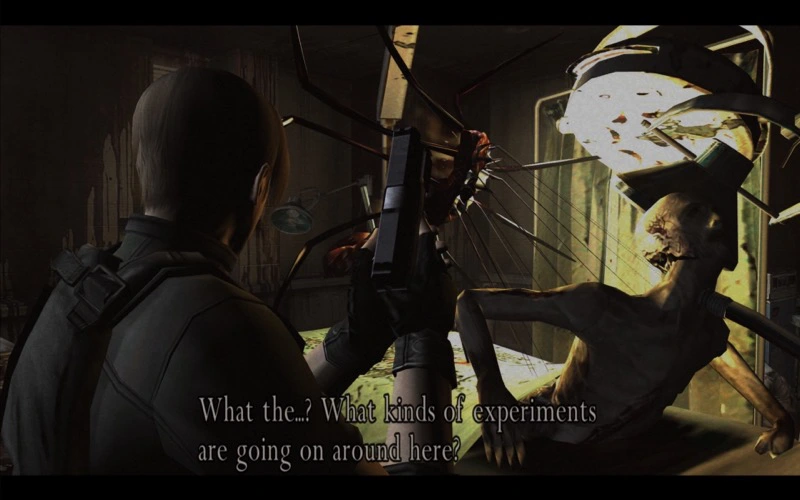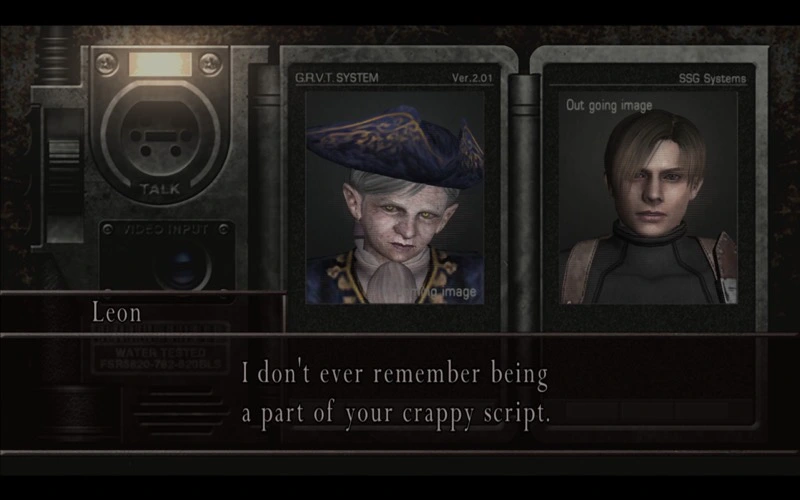by Dan McAlister

Score: 5/5
Available: PC, Nintendo Switch, PlayStation 4, Xbox One
Resident Evil 4‘s Leon Kennedy is an action hero, mostly. After surviving a zombie virus outbreak in Resident Evil 2, he’s been recruited by the US government to save the president’s daughter from a mysterious cult in Spain. He’s got a briefcase full of firearms and grenades, and when enemies pull away from a fight he responds, “Where’s everyone going? Bingo?” He’s all charm and swagger, no fear.
But Resident Evil 4 isn’t an action comedy: it’s an action horror game, and thus a member of a prevalent but seemingly contradictory genre. While action emphasizes capability and direct conflict, horror foregrounds vulnerability, disempowerment, and the fear of futility. I said in my review of Dead Space: Extraction that it can be hard to fear zombies when you have a machine gun. Can the player feel vulnerable and powerful at the same time?
Resident Evil 4 doesn’t meld those two feelings so much as it maneuvers back and forth between them. It uses unique controls, variety, and pacing to alternate between feelings of power and fear, like an inhale-exhale pattern of opposites. That it mixes two distinct feelings so capably is exciting; that it does so with a great deal of winking charm is wonderful. I wish all games were this confident.

Let’s start with those controls: at first, they felt clunky. I would swing the aim of my gun back and forth, struggling to draw a bead on advancing cultists. I had trouble adjusting to the point where I checked to see if I had controller problems (no) or if there were menu options for aim sensitivity (also no, an unnecessary loss for accessibility). But the odd control choices don’t stop at aiming: Leon walks slowly, turns slowly, won’t run unless you’re holding down a separate button, and won’t lob a grenade without first ducking into the inventory management screen. Most jarringly, Leon can’t shoot while moving: raising his gun brings him to a standstill. Shooters since the original Halo in 2001 have felt streamlined, removing friction between impulse and in-game action. Resident Evil 4 moves in the opposite direction.
But in this case, more restrictive controls aren’t “worse” so much as they create a different outcome. What happens when your actions are stalled by a game’s control friction? Gameplay choices become more distinct from one another. Take the moving and shooting: in most shooters, moving makes you a harder target for enemy fire, so it makes sense to always be on the go. But Resident Evil 4 keeps these options mutually exclusive. If you’re shooting, you’re standing still, which makes you a target. If you’re moving you’ve put your gun away, giving your enemies a chance to regroup. There’s no option that doesn’t leave you vulnerable, so you’re always evaluating trade-offs. The result is less time “disappearing” into the character, and increased awareness of each move you make, increased self-scrutiny. The game uses its unorthodox controls to heighten the tension, and it works to great effect.
The panic sets in when you have to make these choices faster and faster. One of the first scenes is set in a village where Leon is getting swarmed by cultists. There are houses on all sides of a village center, with enemies pouring out of alleyways and popping off shots from windows. You can stay in the center and try fighting off the mob, but Leon’s slow turning makes defending from all sides difficult. In situations like these, I learned to seek out walls I could put my back against, limiting blind spots. But if I stay in one place, I might run short on ammo and be forced to scavenge amongst the houses, once more putting me in a vulnerable position. Leon may be an action hero, but the game rarely allows him moments of pure, assured dominance. Almost every period of unloading your weapon is followed by a scramble.
That would be compelling if the game’s scenes were just firefights, but the developers are constantly throwing Leon into different kinds of hot water. I prowled a sewer while keeping an eye out for the shimmer of aggressive, camouflaged monsters. I rode a gondola, trying to pinpoint ranged attackers before they lined up a shot on me. I navigated a hedge-maze filled with monstrous, bug-infested dogs. Hostility pervades the game’s atmosphere, even lingering in its calmer moments. I hugged the walls as I entered a room with ornate sculptures suspended upside-down from the ceiling, fearing they would collapse on me. They didn’t, but Leon endures so many lethal surprises that I felt the game could lunge out at me at any time.

The game created a paranoia in me that was repeatedly validated. In one scene near a waterfall, I took out a lone guard from a distance before drawing closer to comb the area for clues on how to advance. I discovered a secret passage, but was immediately onset from multiple directions by enemies brandishing axes and torches. I went over my options in a panic: stay in a vulnerable position and fight? Try to fight only the enemies in my way and race to the passage, hoping the others approaching from the side are too slow? Do I even have enough ammo for this? I experienced something similar later on, after I fought through a riotous graveyard scene only to pass through a chapel door and encounter a total silence, save for a faint rain hitting the roof. I was spooked when I moved forward and heard footsteps, which were my own. Is this another false reprieve?
If the game was constantly elevating my heart rate, Leon never showed it. The story sets a thick layer of camp across the proceedings. Leon banters with a charming mystery man, a putrid royal, and Ada Wong, a femme fatale rival agent who pairs an impractical, revealing red dress with a sub-machine gun. Enemies monologue and taunt Leon, unmoved by the way he mows down their forces. He quips right back every time. The dialogue is cheesy but appreciated, a welcome reprieve during a tense experience. These moments helped me smile and collect myself before pressing forward.

While Leon swaggered through the story, my actual play was cautious. I monitored ammo, snuck along walls, and constantly checked behind myself for surprise attacks. When I finished his campaign, I felt more like a survivor than a victor. Then I unlocked Separate Ways.
Separate Ways is a shorter side campaign starring Ada Wong, where you see the story events play out from her perspective as she dodges in and out of Leon’s adventure. She works across the same map, with objectives that often move her in Leon’s opposite direction, but through many similar firefights. This remix of what came before created an opportunity for me. After Leon’s campaign dug at my natural caution, forcing my back against so many walls, playing Ada’s missions felt liberating. I knew the tricks of the environment, the ways to knock enemies down more efficiently, the encounters that were necessary and the ones you could strategically circumvent. I abandoned the defensive crouch, the perpetual seeking of defendable positions, and instead leapt through the action. Leon’s campaign was a struggle, but with Ada I was on a victory lap.
I had often ended my play sessions feeling ragged, pausing an experience that had me constantly on edge. But now that it’s through, I’m seeing things more from Leon and Ada’s confident perspective. For all its moments of horror, Resident Evil 4 made me feel like an action hero who survived.
Pilediver is a review series where I play through the many, many games in my backlog. Thank you for reading.
The opinions in this post are expressly the views of the author and do not reflect the views of their employer(s) or any entities that they might otherwise be affiliated.